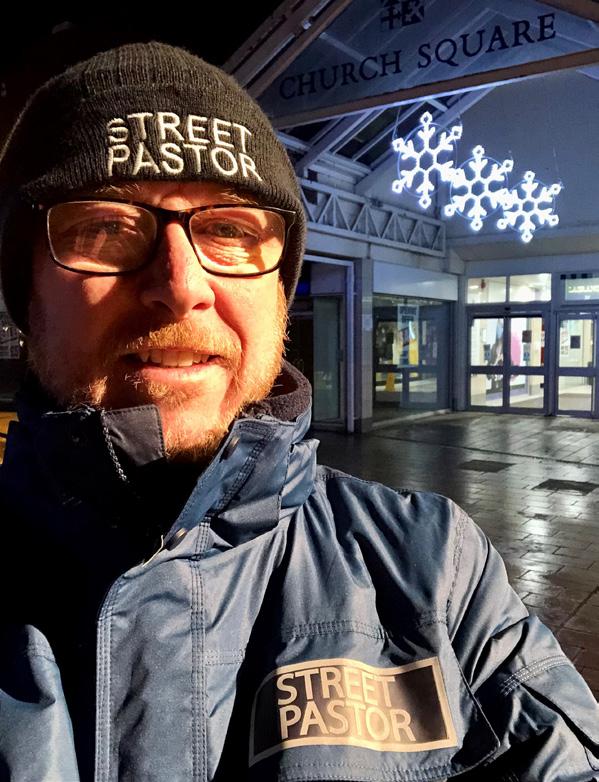
3 minute read
Dialogue and Unity Street Pastors responding ecumenically to pastoral needs
Ultan Russell, Archdiocesan Ecumenical Officer
associated evils of gun and knife crimes. As it spread activities widened to include substance abuse, anti-social behaviour and most significantly often being a friendly face and a resource for practical advice.
Advertisement
a Street Pastor and are leading a Christian lifestyle. It is very professional and well planned as twelve training sessions spread over a year, must be completed topics include managing conflict, counselling and basic first aid.
One of the fastest growing interchurch initiatives in the UK is a network of Christian charities called Street Pastors. They are individuals who devote time and energy to assist those who they feel are in need of help, and to share their faith through their service.
Individual street pastors are Christians who walk around the streets of their towns and cities attempting to help and care for people in practical ways often at night in urban centres where clubs, pubs and entertainment venues are concentrated. Street pastors wear a blue uniform, with the term ‘Street Pastor’ visible in white. They are not police, ambulance, or official emergency services in any way. They do not have any powers of law enforcement, arrest or to compel any member of the public to follow any requests given.
The movement began here in Brixton North London in 2003. It is based on a model effectively developed in Jamaica. When it started in London activities focused on challenging gang culture and the
By 2008 there were Street Pastors groups in 70 locations, today there are over 270 active branches. In the archdiocese there are branches in Chorley, Liverpool City Centre, Ormskirk, St Helens, Southport, Warrington, Widnes, Wigan and one just over the water on the Wirral. Now it has spread outside of the United Kingdom to Jersey, Gibraltar, Cork, Dublin, Nigeria, USA, Antigua and Barbuda, Jamaica, and Trinidad and Tobago.
In 2011 a sister organisation, School Pastors was launched nationally after several trial projects. School Pastors aim to reduce bullying, anti-social behaviour, and drug use, and to remove barriers to learning. They mentor young people within a school setting and walk around outside to break patterns of negative behaviour at the end of the school day. The idea mushroomed so in 2014 Rail Pastors was launched. Their Volunteers receive training from the Samaritans and British Transport Police and aim to prevent suicide attempts and fatalities on the railway.
Street Pastors has an invaluable support network called ‘Prayer Pastors’, they provide support and affirmation by praying for the volunteers and keeping in contact by phone to encourage them in their roles.
Individual street pastors are Christians, over the age of 18, who pass an enhanced CRB check and who have a positive reference from their parish priest or minister supporting them in their wish to become
St Helens Street Pastors is a magnificent example of the work undertaken. They have a growing team of trained volunteers from local churches. Three new volunteers were recently commissioned so there are now ten volunteers. The first team undertook their first patrol on 23 December 2016 and now six years on there are three teams and with the vision to expand even further to reach more people in a vulnerable position. Their mission is to provide a calming presence, a listening ear and practical help to vulnerable people in the nighttime economy of St Helens, showing God’s love to anyone and everyone they meet. The teams have patrolled the town centre streets from 10.30 pm to 3.30 am on the first Saturday and second Friday night of each month for the last couple of years, and they are preparing to launch a third patrol on the fourth Friday of each month. As they recruit and train more volunteers they will be able to increase this to a patrol team going out every weekend.
The volunteers often find themselves being listening ears for someone who in that moment really needs it; or just providing some practical help by giving out water, flip flops and space blankets to help keep people safe. They are often able to sign post people to services that can really help them; and other times they are just making sure that people get home safely. So, being a Street Pastor can look like so many things, but ultimately it is a tool that we use to be the hands and feet of Jesus; to show kindness and compassion and the love of God to those around us. Pictured is Deacon Paul Rooney who is a Street Pastor and a team leader in St Helens as is his wife Jane.
More information can be found at: https://www.streetpastors.org









